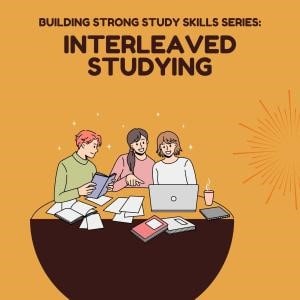Note: This series details how to study smarter, not harder, to help students succeed in their academics. All information in this series draws upon principles from psychological research on learning and memory.
How do you break up your studying when reviewing several different subjects? Do you study one subject for an hour and then switch to the next? Do you study for one subject on one day and another subject on a different day? This method is called blocked practice.
Now that we’ve gotten the worst study techniques out of the way, we will discuss effective study techniques. Today we talk about interleaved studying. Interleaving involves alternating between two or more subjects in a single study session. You can use interleaving for academics, music, and art!
Benefits of Interleaving
Compared to the blocked practice, you can retain information better with interleaving, acquire skills more effectively, and improve your abilities. These phenomena are part of the interleaving effect.
How to Interleave
To interleave your assigned readings, you may alternate between reading your physics book and your math book. Similarly, to interleave piano practice, you may switch between perfecting your performance piece, working on your technique workbook, and learning theory. To interleave illustration practice, you may rotate between using pen and ink, watercolor, and acrylics.
Interleave Properly
Everyone is different, so you have to practice interleaving to find what works best for you! But here are some general guidelines:
- Typically, interleaving works best when you study each topic for about 15 minutes before switching to the next. But this number ranges from 10-30 minutes depending on the person and subject. And, interleaving various subjects may look different. For example, interleaving readings may work best when you spend 15 minutes on each, whereas interleaving math and physics problems may work best when you spend 10 minutes on each.
- Interleaving works best if you alternate between similar subjects, not identical ones, but also ones that aren’t too different. For example, it is more useful to interleave, say, math and chemistry than math and history. You could even interleave chemistry practice problems in thermodynamics and electrochemistry.
- Interleaving is usually best when alternating between 2-3 subjects, but not more than that.
Warning
Interleaving is challenging – especially at first. Many students give up because they think they learned less in interleaving practice than in their blocked practice. And they very well may have had less success when they were getting used to the new study skill. However, once students get the hang of interleaving, they are more likely to retain the material.
Summary
Although interleaving can be challenging for beginners, it is more effective for retaining material, mastering skills, and improving your abilities. Although interleaving is effective, it shouldn’t be your only study skill. It should be used in conjunction with other study techniques that will be detailed in coming installments of this series.
Keep up with our weekly Building Strong Study Skills series to learn the most effective study strategies and succeed in your academics. Schedule a session with one of our expert tutors today to receive all the information and guidance you need to gain a deeper understanding of your academics and perform better on your tests! Building effective study habits takes time, so the sooner you get help, the better prepared you will be by the time finals roll around.
Read Other Articles in The Building Strong Study Skills Series
Sources:
- Terry, W.S. (2018). Learning and Memory: Basic Principles, Processes, and Procedures, Fifth Edition. New York, Routledge, a Taylor and Francis Group. ISBN 978-1-13-864591-2.
- Rhodes, M.G., Cleary, A.M. and DeLosh, E.L. (2020). A Guide to Effective Studying and Learning: Practical Strategies from the Science of Learning. New York, Oxford University Press. ISBN 978-0-19-021447-0 (pbk)

